National
Senate panel approves DP bill, takes OPM to task

Sen. Susan Collins (R-Maine) praised the Domestic Partnership Benefits & Obligations Act as a way for the federal government to compete with the private sector in attracting the most qualified workers. (DC Agenda photo by Michael Key)
A Senate panel approved legislation last week that would provide domestic partner benefits to LGBT federal workers, but not before criticizing the Obama administration for allegedly not providing information on how to offset costs for the bill.
The Senate Homeland Security & Governmental Affairs Committee reported out the legislation — known as the Domestic Partnership Benefits & Obligations Act — on an 8-1 vote. The lone vote of dissent during the markup was Sen. Robert Bennett (R-Utah).
Counting the votes of senators who didn’t attend the markup and voted by proxy, the legislation was reported from the committee, 10-6.
The legislation, S. 1102, would make available to the same-sex partners of LGBT federal workers benefits afforded to the spouses of straight employees, including health and pension benefits.
Joe Solmonese, president of the Human Rights Campaign, said in a statement that the committee’s approval of the bill “is an important step toward guaranteeing equal compensation for lesbian and gay workers serving our government at home and abroad.”
But key supporters of the bill criticized the U.S. Office of Personnel Management during the markup for not explicitly providing information on how to offset the cost of the legislation — an estimated $63 million each year — and said a Senate floor vote wouldn’t take place until that data is provided.
Sen. Joseph Lieberman (I-Conn.), chair of the committee and sponsor of the bill, said he earlier asked OPM to provide information on costs offsets, but received no information by the time of the markup.
“We’re willing to do this and finance it within offsets from the existing OPM budget,” Lieberman said. “They were unable, for some reason, to get that information across to us this morning.”
Lieberman pledged that a Senate floor vote wouldn’t take place until OPM provides the information to senators. He had said earlier during an October committee hearing that he expected a floor vote on the bill early next year.
In a statement, OPM director John Berry, who is gay, responded to the comments from Lieberman and others by praising the committee for approving the legislation and promising to work with senators as the legislation progresses.
“I am confident that we will be able to work with [the Office of Management & Budget] and the Committee to address the concerns raised today so that forward progress can continue,” he said.
Both Lieberman and Sen. Susan Collins (R-Maine) praised the bill as a way for the federal government to compete with the private sector in attracting the most qualified workers.
Collins said the legislation would be particularly effective in attracting younger people to the federal workforce.
“It matters to them — whether they are straight or gay,” she said. “It matters to them because they view it as part of the offer that any good employer would provide.”
CPAC retains gay group as sponsor, despite boycott threats
A prominent, conservative convention is letting a gay group remain a co-sponsor despite threats from others who say they might boycott the event.
Organizers of the national Conservative Political Action Conference, set to take place in D.C. in February, are allowing GOProud, a gay conservative group, to continue as a co-sponsor in the face of calls to exclude it from the event.
Asked about the boycott threats, a CPAC spokesperson deferred to a statement from event director Lisa de Pasquale that was published this week in Hot Air, a conservative publication.
“After talking with their leadership and reviewing their web site, I am satisfied that they do not represent a ‘radical leftist agenda,’ as some have stated, and should not be rejected as a CPAC cosponsor,” she was quoted as saying.
On the agenda for GOProud, according to the organization’s web site, is repeal of “Don’t Ask, Don’t Tell” and opposition to the Federal Marriage Amendment. It supports gun ownership rights and privatization of Social Security and favors repealing the estate tax. The group was among those that opposed the nomination of U.S. Associate Justice Sonia Sotomayor.
Jimmy LaSalvia, executive director of GOProud, said he’s “excited” his organization will take part in the event, which some consider the most important annual gathering for conservatives.
“I just think that we’re excited to be a part of it,” he said. “I don’t have anything more to add to that. We’re just moving ahead and looking forward to being part of that important event.”
Although GOProud contributed $4,000 to co-sponsor CPAC, LaSalvia said a decision hasn’t been made yet on whether the group would have a speaking role at the event. He said more details would become known after a meeting in January. — By Chris Johnson
U.S. Supreme Court
Supreme Court to consider bans on trans athletes in school sports
27 states have passed laws limiting participation in athletics programs

The U.S. Supreme Court on Thursday agreed to hear two cases involving transgender youth challenging bans prohibiting them from participating in school sports.
In Little v. Hecox, plaintiffs represented by the ACLU, Legal Voice, and the law firm Cooley are challenging Idaho’s 2020 ban, which requires sex testing to adjudicate questions of an athlete’s eligibility.
The 9th U.S. Circuit Court of Appeals described the process in a 2023 decision halting the policy’s enforcement pending an outcome in the litigation. The “sex dispute verification process, whereby any individual can ‘dispute’ the sex of any female student athlete in the state of Idaho,” the court wrote, would “require her to undergo intrusive medical procedures to verify her sex, including gynecological exams.”
In West Virginia v. B.P.J., Lambda Legal, the ACLU, the ACLU of West Virginia, and Cooley are representing a trans middle school student challenging the Mountain State’s 2021 ban on trans athletes.
The plaintiff was participating in cross country when the law was passed, taking puberty blockers that would have significantly reduced the chances that she could have a physiological advantage over cisgender peers.
“Like any other educational program, school athletic programs should be accessible for everyone regardless of their sex or transgender status,” said Joshua Block, senior counsel for the ACLU’s LGBTQ and HIV Project. “Trans kids play sports for the same reasons their peers do — to learn perseverance, dedication, teamwork, and to simply have fun with their friends,” Block said.
He added, “Categorically excluding kids from school sports just because they are transgender will only make our schools less safe and more hurtful places for all youth. We believe the lower courts were right to block these discriminatory laws, and we will continue to defend the freedom of all kids to play.”
“Our client just wants to play sports with her friends and peers,” said Lambda Legal Senior Counsel Tara Borelli. “Everyone understands the value of participating in team athletics, for fitness, leadership, socialization, and myriad other benefits.”
Borelli continued, “The U.S. Court of Appeals for the Fourth Circuit last April issued a thoughtful and thorough ruling allowing B.P.J. to continue participating in track events. That well-reasoned decision should stand the test of time, and we stand ready to defend it.”
Shortly after taking control of both legislative chambers, Republican members of Congress tried — unsuccessfully — to pass a national ban like those now enforced in 27 states since 2020.
Federal Government
UPenn erases Lia Thomas’s records as part of settlement with White House
University agreed to ban trans women from women’s sports teams

In a settlement with the Trump-Vance administration announced on Tuesday, the University of Pennsylvania will ban transgender athletes from competing and erase swimming records set by transgender former student Lia Thomas.
The U.S. Department of Education’s Office for Civil Rights found the university in violation of Title IX, the federal rights law barring sex based discrimination in educational institutions, by “permitting males to compete in women’s intercollegiate athletics and to occupy women-only intimate facilities.”
The statement issued by University of Pennsylvania President J. Larry Jameson highlighted how the law’s interpretation was changed substantially under President Donald Trump’s second term.
“The Department of Education OCR investigated the participation of one transgender athlete on the women’s swimming team three years ago, during the 2021-2022 swim season,” he wrote. “At that time, Penn was in compliance with NCAA eligibility rules and Title IX as then interpreted.”
Jameson continued, “Penn has always followed — and continues to follow — Title IX and the applicable policy of the NCAA regarding transgender athletes. NCAA eligibility rules changed in February 2025 with Executive Orders 14168 and 14201 and Penn will continue to adhere to these new rules.”
Writing that “we acknowledge that some student-athletes were disadvantaged by these rules” in place while Thomas was allowed to compete, the university president added, “We recognize this and will apologize to those who experienced a competitive disadvantage or experienced anxiety because of the policies in effect at the time.”
“Today’s resolution agreement with UPenn is yet another example of the Trump effect in action,” Education Secretary Linda McMahon said in a statement. “Thanks to the leadership of President Trump, UPenn has agreed both to apologize for its past Title IX violations and to ensure that women’s sports are protected at the university for future generations of female athletes.”
Under former President Joe Biden, the department’s Office of Civil Rights sought to protect against anti-LGBTQ discrimination in education, bringing investigations and enforcement actions in cases where school officials might, for example, require trans students to use restrooms and facilities consistent with their birth sex or fail to respond to peer harassment over their gender identity.
Much of the legal reasoning behind the Biden-Harris administration’s positions extended from the 2020 U.S. Supreme Court case Bostock v. Clayton County, which found that sex-based discrimination includes that which is based on sexual orientation or gender identity under Title VII rules covering employment practices.
The Trump-Vance administration last week put the state of California on notice that its trans athlete policies were, or once were, in violation of Title IX, which comes amid the ongoing battle with Maine over the same issue.
New York
Two teens shot steps from Stonewall Inn after NYC Pride parade
One of the victims remains in critical condition

On Sunday night, following the annual NYC Pride March, two girls were shot in Sheridan Square, feet away from the historic Stonewall Inn.
According to an NYPD report, the two girls, aged 16 and 17, were shot around 10:15 p.m. as Pride festivities began to wind down. The 16-year-old was struck in the head and, according to police sources, is said to be in critical condition, while the 17-year-old was said to be in stable condition.
The Washington Blade confirmed with the NYPD the details from the police reports and learned no arrests had been made as of noon Monday.
The shooting took place in the Greenwich Village neighborhood of Manhattan, mere feet away from the most famous gay bar in the city — if not the world — the Stonewall Inn. Earlier that day, hundreds of thousands of people marched down Christopher Street to celebrate 55 years of LGBTQ people standing up for their rights.
In June 1969, after police raided the Stonewall Inn, members of the LGBTQ community pushed back, sparking what became known as the Stonewall riots. Over the course of two days, LGBTQ New Yorkers protested the discriminatory policing of queer spaces across the city and mobilized to speak out — and throw bottles if need be — at officers attempting to suppress their existence.
The following year, LGBTQ people returned to the Stonewall Inn and marched through the same streets where queer New Yorkers had been arrested, marking the first “Gay Pride March” in history and declaring that LGBTQ people were not going anywhere.
New York State Assemblywoman Deborah Glick, whose district includes Greenwich Village, took to social media to comment on the shooting.
“After decades of peaceful Pride celebrations — this year gun fire and two people shot near the Stonewall Inn is a reminder that gun violence is everywhere,” the lesbian lawmaker said on X. “Guns are a problem despite the NRA BS.”



















